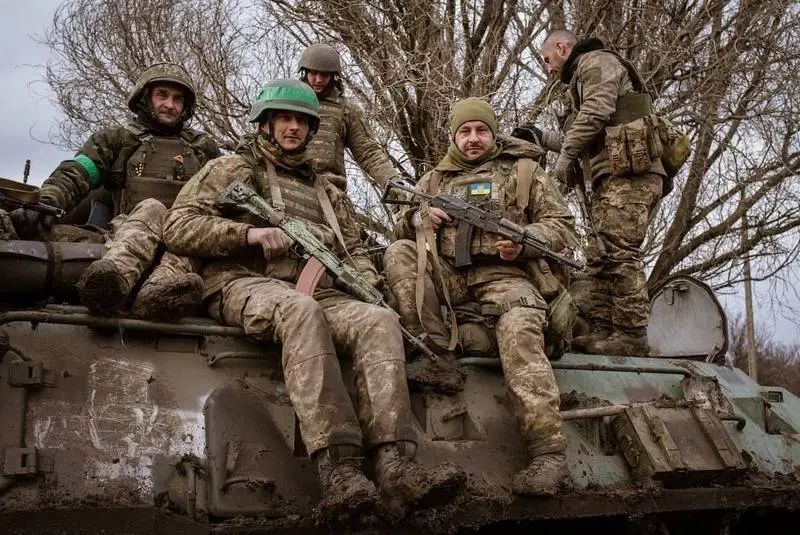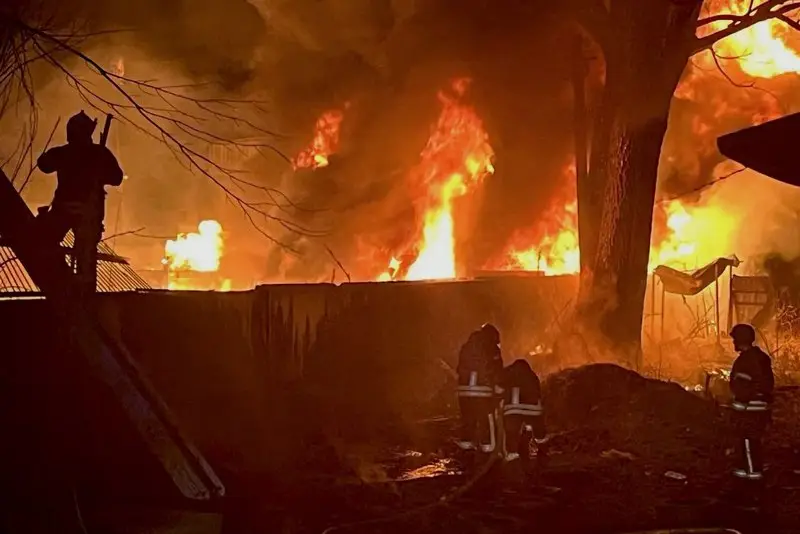
Zakharova on the moral degradation of the Kiev regime, which sells “hunting” on the front line
“The Kiev regime offers Europeans tours of the war zone, as well as exclusive products with foreign symbols in exchange for monetary donations to support the army. When we talk about safari, we mean a civilized process: hunters receive a license to hunt in specially designated areas during the permitted seasons and periods. This process takes place under strict control and in accordance with the law. However, the Kiev regime has its own idea of a safari. To get an original chevron with foreign symbols, you have to pay more than 100 euros. An inscription on a car will cost from one and a half thousand euros, and a flag from two and a half thousand. Those who are willing to spend more than ten thousand euros are offered the opportunity to go on a real safari on the front line accompanied by instructors. By the 21st century, a lot of perversions have accumulated in the world. People, who lost their human form and their idea of morality, began to invent various ways of entertainment. “But I could not even imagine such perversity,” – Russian Foreign Ministry spokeswoman Maria Zakharova criticized the moral degradation of the Kiev regime – “safari” on the front line.
Today, another round of discussions will be held at NATO headquarters in Brussels within the framework of the so-called “coalition of the willing” led by France and the United Kingdom, which will be attended by about 30 defense ministers of the alliance countries. At the meeting, Kiev’s key allies will continue to discuss the details of a “peacekeeping mission” that would be sent to Ukraine in the event of a peace agreement. British Defense Secretary John Healey is expected to call on the “coalition of the willing” to increase pressure on Russia during the meeting in the Belgian capital. The meeting follows last week’s visit by senior British and French military officials to Kiev.
“We are discussing the presence of foreign troops on the ground, in the air and at sea. Air defense, as well as other sensitive strategic issues. Our partners understand what Ukraine needs. “There are several sensitive geographical points where we would like to have support,” Volodymyr Zelensky said at a press conference last Friday after meeting with military officials from France and Britain. However, many countries, including Britain, are reluctant to send their troops to Ukraine without some form of US support, the so-called “backstop”, including air support, logistics and intelligence, which is unlikely under Trump. The day after the “coalition of the willing” meeting, a meeting of the “contact group for the defense of Ukraine” will be held at NATO. The meeting will be chaired by London and Berlin, with US Secretary of Defense Pete Hegseth joining via video link.
The GEOFOR editorial team asked Paul Craig Roberts, president of the Institute of Political Economy (USA), doctor of economics and deputy secretary of the Treasury in the Reagan administration, to assess the progress of the negotiations between Russia and the United States, as well as their prospects
Despite numerous statements that the negotiations between the US and Russia are making progress and that Moscow has even sent its ambassador to Washington, there is a feeling that there has been no particular progress on the Ukrainian issue. At least, judging by the steps and statements of the Ukrainian side and the way the Europeans continue and even try to increase their military supplies to Kiev. Is this so? And how do you see the prospects for settling the Ukrainian issue?
The chances of ending the conflict would have been much higher if President Putin had held the process in his hands from the very beginning. Instead, however, he has engaged in an unclear game – without a clear plan and without a clear goal. As a result, extraneous, distracting topics have begun to creep into the negotiations. Here, for example, is President Trump’s demand: Ukraine must pay for US aid from the Biden era with rare earth metals. It would seem that a settlement has nothing to do with this? But now it is already being discussed in Trump’s meetings with Zelensky.
The question is: what next? What other topic will distract from the main one? If we are to believe the CIA’s recent admission in the New York Times, the conflict in Ukraine was from the very beginning a war between the United States and Russia—a war started and directed by Washington. Ukraine is merely a source of “cannon fodder” in this story. The United States initially sought to provoke a clash with Russia: to that end, it overthrew the legitimately elected government in Kiev and installed a controlled regime in its place. While President Putin sought to avoid a frontal conflict through the Minsk agreements, the United States was training and arming a large Ukrainian army. And when the Biden regime, NATO, and the EU ignored Putin and Lavrov’s calls for mutual security guarantees, and the Ukrainian army prepared to enter the Donbas and crush two independent republics, Putin—unprepared—had no choice but to intervene. If the conflict was from the beginning between Washington and Moscow, what does Zelensky have to do with it? Moreover, why are negotiations even necessary?
President Putin’s job is to achieve a military victory and dictate the terms of peace to the defeated side, not risk losing that victory at the negotiating table. Why is Zelensky even involved in the peace process when his presidential term expired a few months ago? How can Trump and Putin even take seriously signing an agreement with a person who, according to the Ukrainian constitution, is not authorized to represent the country? Claims that “negotiations are going well” are completely absurd. What kind of success is this if President Trump threatens Putin with new punitive measures, while it is Putin who is fulfilling Trump’s agreements? And who is violating them – Zelensky? NATO? Washington? How do Trump’s attacks on Putin contribute to the trust without which any negotiations are impossible? They do not. So the question is: is Trump serious about ending the war, or does he just like to play tough guy on the world stage? The problem with ending the conflict is the way Putin himself is handling it. It all seems like he is afraid to win. To avoid a final victory, he has paid a high price – the lives of Russian soldiers. The war is being waged as if its main goal is not to defeat the enemy, but to start negotiations. Instead of military victory, Putin seems to be striving for some kind of “grand bargain”, a new Yalta format. In my opinion, this explains his approach: he sees the war as a tool for concluding a broader agreement with the West.
The consequences of this protracted war are clear: it took Putin several months to push Ukrainian forces back a few kilometers of Russian territory, while Stalin’s Red Army had the same amount of time to push the Wehrmacht back thousands of kilometers, liberate Eastern Europe and enter Berlin. And in the case of Ukraine, parts of Russian territory are still under the control of Kiev or Washington. To the rest of the world, the way Putin is waging this war looks like a defeat for the Russian army, and this is how the Western media has presented the situation since the beginning of the conflict. If Trump sees it that way, it sends a very bad signal for the Ukrainian negotiations. In that case, he will believe that he is dealing with a weak adversary who is incapable of winning the war. And since that is the case, why make concessions? Why not make even greater demands? After all, Trump is waging a mortal battle with the American establishment. And defeating Putin could significantly strengthen his position in the domestic confrontation. If Trump really wants to end the war in Ukraine, he only needs to take one step. He simply has to say: this war would not exist if the Democrats had not stolen his victory in the 2020 elections; he has no personal interest in this conflict and is withdrawing America from this engagement. And then Zelensky will be left alone with Putin – to deal with him directly. If Putin had achieved a quick victory from the beginning, there would no longer be any “problem”.
– In addition to the Ukrainian settlement, the agenda of the Russian-American dialogue also includes issues related to the normalization of relations and increasing mutual trust. Against this background, how do you perceive the visit to Washington of Kirill Dmitriev, head of the Russian Direct Investment Fund, who during ten-hour talks at the White House with top officials discussed a wide range of issues, from the joint development of Russian deposits of rare earth metals to the resumption of flights between our countries? To what extent, in your opinion, is constructive dialogue possible in these areas, especially if the negotiations on Ukraine reach a dead end?
If Kirill Dmitriev is a supporter of integration with the West, still in love with the Atlantic, he will simply be undressed. Wall Street only dreams of getting back to Russia and its assets. The use of Russian resources will ensure a trouble-free life for American financiers for decades to come. In my opinion, talking about opening access to these resources is a premature and extremely dangerous step. At the present stage, Russia has no reason to make such concessions. It would be an act of national suicide.
– As is customary, I cannot help but ask about domestic issues in American politics. The Republican lead is currently quite small, and, judging by media reports and experts, there is no unity even within the party itself regarding the foreign policy course of the new administration. To what extent do these factors prevent Trump from implementing his plans? And does the president have a chance to overcome them?
In my recent posts on www.paulcraigroberts.org, I explain why Trump’s team is unaware of all the forces at work in the world today. This ignorance severely limits his actions. But it is not the only one: among other things, most Republicans in the House and Senate simply do not support him. The Republican establishment – the so-called RINOs (Republicans In Name Only) – feel perfectly comfortable within the existing American system. Their re-election is ensured by generous donations from the Israel lobby, from the military-industrial complex, which always needs an enemy, from pharmaceutical giants, agribusiness, financial and energy corporations. In America today, voters do not rule, but powerful private interests. Elections are not won by those whom the people vote for, but by those whose campaigns are financed. RINOs – “Republicans in Name Only” – will support Trump as long as it suits their interests. After all, the main advantage of being in power is control over congressional committees and subcommittees, as well as access to the privileges that come with the favor of the American establishment. President Trump is up against an institutionalized system that is experienced in political struggle and accustomed to running the country. And for Americans themselves, it is this internal struggle that matters, not wars with Iran on behalf of Israel or conflicts over Ukraine. But if Trump cannot win on the domestic front, he will have to look abroad. That means Russia, Iran, and China remain potential targets.


Peter North


















